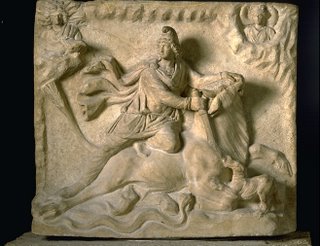Yalda Night

Yalda
Yaldā also known as Shab-e Cheleh is celebrated on the eve of the first day of the winter (21th December) in the Iranian calendar, which falls on the Winter Solstice. It celebrates the birth of Sun god Mithra.
Historical Background
The festival was considered extremely important in pre-Islamic Iran and continues to be celebrated to this day, a period of more than 6000 years.
Yalda, a Syriac word (ܝܠܕܐ) imported into the Persian language by the Syriac Christians means birth ("tavalod" and "meelaad" are from the same origin) and generally refers to Christmas in the Syriac language. It is a relatively recent arrival and it is refereed to the "Shab e Cheleh Festival" a celebration of Winter Solstice on December 21.
Forty days before the next major Persian festival "Jashn-e Sadeh" this night has been celebrated in countless cultures for thousands of years. The ancient Roman festivals of Saturnalia (God of Agriculture, Saturn) and Sol Invicta (Sun God) are amongst the best known in the Western world.
In most ancient cultures, including Persia, the start of the solar year has been marked to celebrate the victory of light over darkness and the renewal of the Sun. For instance, Egyptians, four thousand years ago celebrated the rebirth of the sun at this time of the year. They set the length of the festival at 12 days, to reflect the 12 divisions in their sun calendar. They decorated with greenery, using palms with 12 shoots as a symbol of the completed year, since a palm was thought to put forth a shoot each month.
The last day of the Persian month Azar is the longest night of the year, when the forces of Ahriman are assumed to be at the peak of their strength. While the next day, the first day of the month "Day" known as "khoram rooz" or "khore rooz" (the day of sun) belongs to Ahura Mazda, the Lord of Wisdom. Since the days are getting longer and the nights shorter, this day marks the victory of Sun over the darkness. The occasion was celebrated in the festival of "Daygan" dedicated to Ahura Mazda, on the first day of the month "Day".
Yalda Ceremony
Fires would be burnt all night to ensure the defeat of the forces of Ahriman (evil). There would be feasts, acts of charity and a number of deities were honored and prayers performed to ensure the total victory of sun that was essential for the protection of winter crops. There would be prayers to Mithra (Mehr) and feasts in his honor, since Mithra is the Yazat responsible for protecting "the light of the early morning" known as "Havangah" It was also assumed that Ahura Mazda would grant people's wishes, specially those with no offspring had the hope to be blessed with children if performed all rites on this occasion.
One of the themes of the festival was the temporary subversion of order. Masters and servants reversed roles. The king dressed in white would change place with ordinary people. A mock king was crowned and masquerades spilled into the streets. As the old year died, rules of ordinary living were relaxed. This tradition persisted till Sassanian period, and is mentioned by Biruni and others in their recordings of pre-Islamic rituals and festivals.
Its Traditional Impact
The Persian traditions merged in ancient Rome, in a festival to the ancient god of seedtime, Saturn. The Romans exchanged gifts, partied and decorated their homes with greenery. Following the Persian tradition, the usual order of the year was suspended. Grudges and quarrels forgotten, wars would be interrupted or postponed. Businesses, courts and schools were closed. Rich and poor became equal, masters served slaves, and children headed the family. Cross-dressing and masquerades, merriment of all kinds prevailed. A mock king, the Lord of Misrule, was crowned. Candles and lamps chased away the spirits of darkness.
Another related Roman festival celebrated at the same time was dedicated to Sol Invictus ("the invincible sun"), originally known as Mithra Originally a Persian deity, this cult was imported by Emperor Elagabalus into Rome and Sol was made god of the state. With the spread of Christianity, Christmas celebration became the most important Christian festival.
Yalda and Islam
With the conquest of Islam the religious significance of the ancient Persian festivals was lost. Today "Shab e Cheleh" is merely a social occasion, when family and friends get together for fun and merriment. Different kinds of dried fruits, nuts, seeds and fresh winter fruits are consumed. The presence of dried and fresh fruits is reminiscence of the ancient feasts to celebrate and pray to the deities to ensure the protection of the winter crops.
Yalda and Judaism
The Iranian Jews, who are amongst the oldest inhabitants of the country, in addition to "Shab e Cheleh" also celebrate the festival of "Illanout" (tree festival) at around the same time. Their celebration of Illanout is very similar to Shab e Cheleh celebration. Candles are lit; all varieties of dried and fresh winter fruits will have to be present. Special meals are prepared and prayers are performed. There are also very similar festivals in many parts of Southern Russia that are identical to "Shab e Cheleh" festival with local variations. Sweet breads are baked in shape of humans and animals. Bon fires are made; dances are performed that resemble crop harvesting. Comparison and detailed studies of all these celebrations no doubt will shed more light on the forgotten aspects of this wonderful and ancient festival, where merriment was the main theme of the festival.
***
[Text: From Wikipedia, world largest free online encyclopedia...]
[Photo: "Mithra" Iranian Godess of Sun, now is kept at Paris Louvre Museum, courtesy of French Department of Culture]

0 Comments:
Post a Comment
<< Home